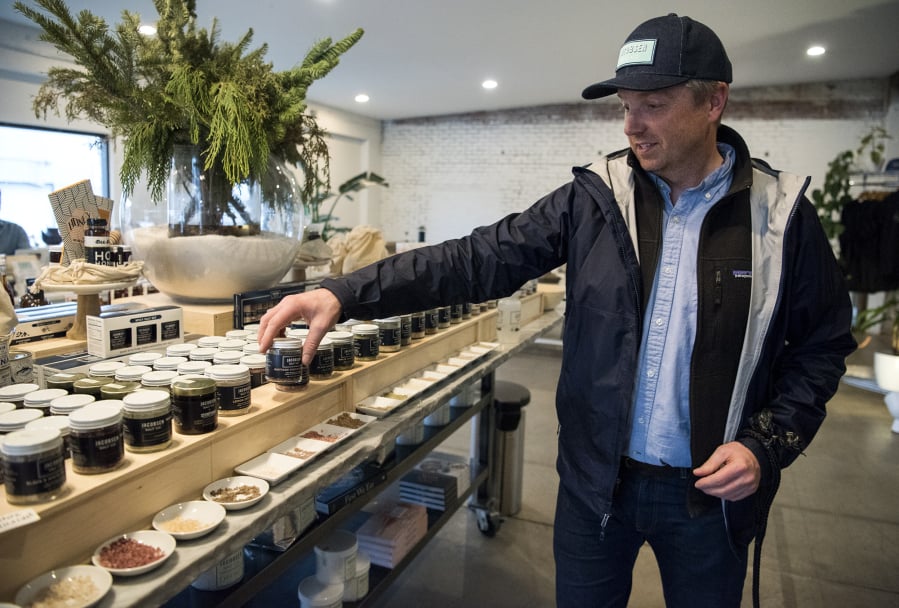Ben Jacobsen started making salt in 2011, and it didn’t take long for the former Vancouver resident to land on some important radars.
The New York Times wrote a story about him in 2012. Noted chefs started to use his salt from Oregon waters. And a Williams-Sonoma Inc. partnership sent his business on a fast, ascending trajectory that hasn’t slowed.
Jacobsen, 43, no longer participates in making the white, flaky crystals. And long gone are the days when he’d drive a seawater-loaded truck from the Oregon Coast to Portland for processing into salt. These days, the Hudson’s Bay High School graduate’s focus is marketing, sales, and product development.
For the future, he plans for more of the same, convinced he’s got the world’s best job.
Jacobsen didn’t show signs of becoming a salt maker when he arrived in Vancouver at age 13 from Burlington, Vt., with his family. His father, neurologist Dr. Paul Jacobsen, had accepted work in town. His mother, Jane Jacobsen, would one day be executive director of the Vancouver-based Confluence Project.
Jacobsen spent a year at McLoughlin Middle School before enrolling at Hudson’s Bay High School. There, he’d dabble with bicycles and bike racing.
Perhaps an entrepreneurship seed was planted at the high school when he and two other students set up a bicycle repair business at Hudson’s Bay, said former Hudson’s Bay teacher Jim Jeffers.
“Ben and his friends pursued getting donated tools, and then we’d work on bikes for staff or other students,” Jeffers, now a Vancouver Public Schools instructional technology facilitator, said in an email. “We set it up as a micro business and worked through the budgeting, setup, staffing, etc.”
While entrepreneurship would not bud for more than a decade, the bicycling passion exploded in college. Jacobsen was captain of the University of Washington Cycling Team when it won the national championship. He earned a degree in 1999 in economic geography at UW and then, after a brief sojourn into marketing, he traveled to Denmark to pursue an MBA at Copenhagen Business School.
A lesson outside of class made all the difference. One day his then-girlfriend brought home some pricey sea salt. Jacobsen, aware of their meager student earnings, questioned the purchase.
“She said just try it,” Jacobsen said. “I did and I was blown away.”
After earning his MBA in 2004, Jacobsen worked in software marketing jobs that allowed him to travel the world — and sample salt.
“I was just blown away by how much better it made simple food,” he said. “Whenever I was traveling, I would try and find some salt from that area because it was a nice way to remember that area. It was inexpensive, easily packable. It was something I could have on my eggs in the morning and think back to that time I was in South Africa or Taiwan or wherever.”
Jacobsen, spending more time stateside, soon realized “no one makes great finishing salt.”
“The rest of the world doesn’t use bad salt,” he said. “The reality is, good salt is most definitely more expensive than commodity salt. But commodity salt only came around during the Industrial Revolution in America.”
Not inspired by software, marketing and sales, Jacobsen followed his hunch. Using $1,500 of his own money, he set out in his 2008 Subaru Forester and traveled the Washington and Oregon coasts, searching for perfect saltwater.
He traveled as far north as Neah Bay at the northwest tip of the Lower 48 and he traveled south, sampling the waters of Willapa Bay in Southwest Washington. In all, he tested 20 spots in Washington and Oregon, ruling out most for obvious reasons: too much turbulence or too many sources of freshwater into the seawater or too much runoff from dairy and logging operations.
But at a spot off Whiskey Creek Road, a few miles north of Cape Lookout State Park and a dozen miles inland of Tillamook, Ore., Jacobsen found the spot.
It’s at Netarts Bay, chosen because it’s protected from the crashing ocean surf and, best of all, features high-salinity water that’s filtered through millions of oysters. Jacobsen Salt Co. was started in August 2011.
“An individual oyster filters up to 20 gallons of water a day,” Jacobsen. “So we get this really nice pre-filtered, high-salinity water that reaches us, and we pump it into our facility and start the salt-making process from there.”
The search for the perfect seawater actually took place after Jacobsen figured out how to make great salt consistently, he says. And he did that at a commercial kitchen in Portland. Hauling water to the city was not a sustainable business model, he decided.
With cash flow, money raised through Kickstarter and a round of funding from friends and family, he established the salt-processing facility near Tillamook, Ore. Then, as now, it takes about two weeks to make 7,500 pounds of flake salt. The process could go faster, Jacobsen says, but the product wouldn’t taste as good.
While he didn’t much care for his marketing and sales experience, that background undoubtedly helped the tenacity of pounding on Williams-Sonoma’s door. The efforts earned a place in their product lineup as well as a slick video on the San Francisco-based company’s website.
Jacobsen sought out high-end chefs, urging them to try his product. That effort paid off. Award-winning chef Gabriel Rucker is among the Jacobsen Salt evangelizers.
“Very few plates leave my kitchens without Jacobsen Salt,” said Rucker, chef and owner of Portland restaurants Le Pigeon, Little Bird Bistro and Canard.
“This is salt made in my own backyard,” said Rucker, who has become friends with Jacobsen. “Why wouldn’t I use it?”
New Seasons stakes a claim as Jacobsen’s first official customer. Ryan White, a merchandiser for the Portland-based grocer, encouraged Jacobsen to ship products to every store after Jacobsen participated in its Local Finds fair. The company’s distinctive logo emanated from that process, New Seasons says.
Jacobsen recalled working with a graphic designer for two days with two things in mind: A logo that looked like the company had been around awhile and a logo that had a clean, European aesthetic. Perhaps because of its simplicity, the logo is an eye grabber whether it’s seen from a car on Whiskey Creek Road or on a grocer’s shelf.
At the company’s warehouse and retail store in Southeast Portland, a 5-ounce jar of chili lime salt is $11. A one-pound box of pure kosher sea salt: $9. A boxed, 12-bottle sampler featuring several infused sea salts: $48.
That may be more than some consumers are accustomed to paying for salt, Jacobsen said. But the track record shows enough consumers buy the stuff, find it makes enough of a difference in the taste of food, and come back for more months later.
Jacobsen’s has more than 40 salt flavors, packaged in more than 70 ways. In 2015, it purchased Oregon honey brand Bee Local. Jacobsen’s has also branched into candy.
Jacobsen has a board of directors that includes a major investor, though Jacobsen himself retains a controlling financial interest in the company that he would not divulge. The board also includes Monica Nassif, who founded Mrs. Meyer’s cleaning products, a brand she sold to S.C. Johnson. And Mary Ellen Signer, the longtime CFO and COO at Stumptown Coffee Roasters, has joined Jacobsen as its CFO.
So Jacobsen sees more growth ahead, though he didn’t specify how or where, beyond “hopefully earning more spots on chef counters and on dinner tables across America.”
The Southeast Portland storage and retail building is at least 100 years old. A giant, wood-slat-covered flatbed trailer that once was used to haul oysters from Netarts Bay and is sometimes used as a dining table for big events, is at least as old. Jacobsen, sitting at that table, took note of some more history.
He knows he’s making salt about 50 miles south of the famous Lewis and Clark Expedition Salt Works, believed to have been in present-day Cannon Beach.
But he’s more amazed that salt production in Oregon appears to have stopped after the Corps of Discovery packed up and headed east.
“It blows my mind that nobody in Oregon or even the Pacific Northwest made salt commercially before us,” he said.
It’s an oversight Jacobsen believes will benefit his company for years to come.




